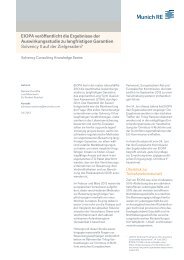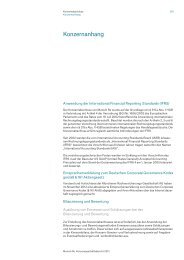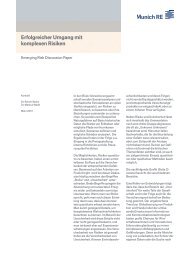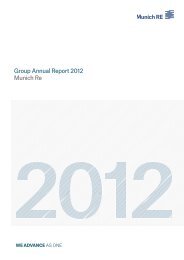Munich Re Group Annual Report 2006 (PDF, 1.8
Munich Re Group Annual Report 2006 (PDF, 1.8
Munich Re Group Annual Report 2006 (PDF, 1.8
Create successful ePaper yourself
Turn your PDF publications into a flip-book with our unique Google optimized e-Paper software.
<strong>Munich</strong> <strong>Re</strong> <strong>Group</strong> <strong>Annual</strong> <strong>Re</strong>port <strong>2006</strong><br />
retirement provision) amounted to only 1.2%. Premium<br />
volume in Poland’s life insurance market recorded very<br />
strong growth of 41.4% in the first three quarters, whilst<br />
growth in non-life insurance was considerably more modest<br />
at 4.8%.<br />
Against a backdrop of high overall economic growth,<br />
the emerging markets recorded the largest increases in<br />
premium income. In China, premium growth totalled<br />
around 23% in property-casualty insurance and 12% in life<br />
business. Premiums also climbed strongly in the Indian<br />
market, with non-life premium rising by around 24% in the<br />
first three quarters of the fiscal year <strong>2006</strong>/2007.<br />
Legal parameters<br />
The German insurance industry is affected by several<br />
items of proposed legislation that will impact its business<br />
in terms of pricing and product design, client relations, and<br />
the overall business processes of companies in the sector.<br />
Various European and global initiatives in the field of<br />
supervisory law have altered the parameters and will continue<br />
to provide for a restructuring of the regulatory landscape<br />
in future<br />
In our home market of Germany, the German Federal<br />
Government intends to extensively reform German insurance<br />
contract law (”Versicherungsvertragsgesetz” – VVG)<br />
to bring it into line with supreme court decisions and the<br />
requirements of what is considered modern consumer protection.<br />
The proposed reform emphasises, for example,<br />
the obligations of insurance companies to provide information<br />
and consultancy prior to and on concluding contracts.<br />
By contrast, the insured’s duties of disclosure prior<br />
to the conclusion of a contract are to be relaxed and sanctions<br />
eliminated, even in the case of gross negligence.<br />
Furthermore, the maximum term of policies in the property-casualty<br />
lines is to be reduced from five to three years<br />
and injured parties are to be granted direct recourse to<br />
insurers under compulsory insurances. Finally, the bill also<br />
proposes to abolish the so-called “policy model” whereby<br />
the policyholder receives the statutory consumer information<br />
together with the policy. In future, clients are to<br />
receive all information concerning policies prior to confirming<br />
their agreement with the terms.<br />
In life insurance, the VVG reform is intended to ensure<br />
the implementation of requirements with which the German<br />
Federal Constitutional Court charged the legislators in its<br />
judgements of 26 July 2005. These concerned policyholder<br />
64<br />
Management report_Parameters<br />
bonuses in endowment insurance and portfolio transfers<br />
between insurance companies. The Federal Constitutional<br />
Court called for hidden reserves to be taken into account in<br />
policyholders’ bonuses, and demanded greater transparency<br />
and competition amongst life insurers.<br />
In its present form, the proposed legislation envisages<br />
that, upon contract termination, 50% of the hidden reserves<br />
apportionable to the individual policyholders will be allocated<br />
to them on a binding basis. Legislators are no longer<br />
pursuing the more far-reaching considerations from spring<br />
<strong>2006</strong> that would have substantially threatened the life<br />
insurance business model. These provided for the binding<br />
allocation of hidden reserves every two years based on<br />
their respective fair value.<br />
A further focus of the reform in life insurance is the<br />
topic of early lapse. To date, surrender values have been<br />
either low or non-existent in the first few years of a policy’s<br />
development due to the offsetting of acquisition and marketing<br />
costs under the “zillmerisation” method. These<br />
costs are to be spread equally over the first five years of a<br />
policy. However, a problematical aspect is that, according<br />
to the current draft of the reform, these regulations are<br />
also to apply to existing insurance portfolios as of<br />
1 January 2008. The bases of insurers’ calculations would<br />
thus be interfered with retroactively. It remains to be seen<br />
whether this will be corrected in the further course of the<br />
legislative process.<br />
In private health insurance, the VVG reform is intended<br />
to create a framework for case and healthcare management<br />
and to open up opportunities for insurers to offer<br />
other services.<br />
The Act is due to come into force on 1 January 2008<br />
and is to be applicable to all existing insurance contracts<br />
effective 1 January 2009. The new regulations for private<br />
health insurance can be introduced for existing policies as<br />
early as 1 January 2008.<br />
The German private health insurance industry will be<br />
impacted directly and intensively by the “Act to promote<br />
competition among statutory health insurance institutions”<br />
(health reform). In particular, private health insurers<br />
will be required to offer a basic policy providing benefits<br />
equivalent in type, scope and amount to the compulsory<br />
provision under statutory health insurance. There will be<br />
an obligation to contract, and benefit exclusions and risk<br />
loadings will not be possible. The premium for this basic<br />
cover is not to exceed the maximum statutory health insurance<br />
premium. It is envisaged that insureds moving from<br />
one private health insurance company to another will be

















